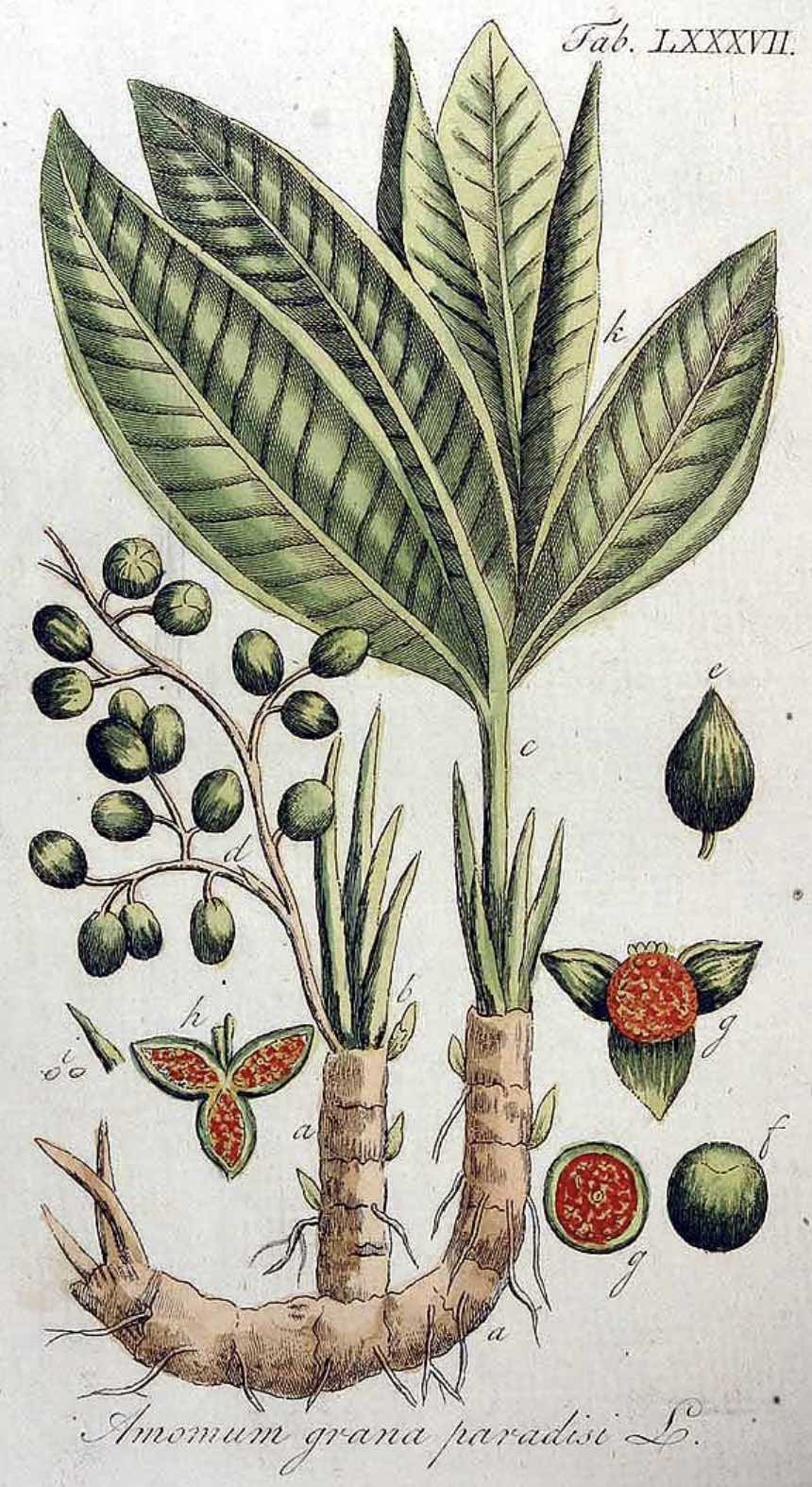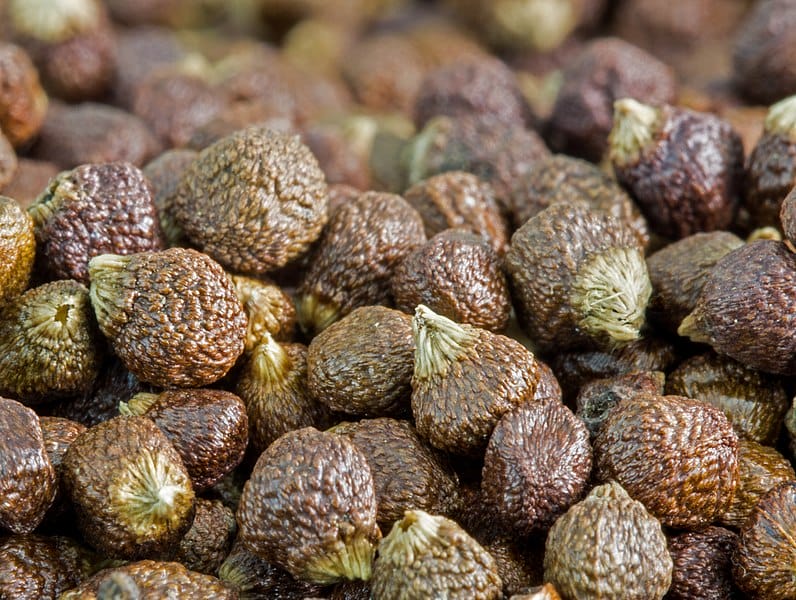Aframomum, Grains of Paradise
Guinea grains, Melegueta Pepper, African Pepper, Alligator PepperHeel Habshi (Unani)
 Zorn, J., Oskamp, D.L., Vervolg op de Afbeeldingen der artseny-gewassen
Zorn, J., Oskamp, D.L., Vervolg op de Afbeeldingen der artseny-gewassen met derzelver Nederduitsche en Latynsche beschryvingen (1813)
 Grains of Paradise
Grains of Paradise(Photo by Shaddiii) (Wikimedia)
Botanical name:
Aframomum melegueta (syn. Amomum melegueta, Amomum grana paradisi)
Aframomum korarima (known as “Flase Cardamon”) is also said to supply Heel Habshi.
Parts used:
Fruit
Temperature & Taste:
Warm, dry. Pungent
Classification:
Uses:
1. Warms the Stomach, Clears Damp:
-enhances digestion similarly to Black Pepper
-Nausea, Indigestion due to Cold and Damp
-Constipation from Cold
2. Clears Wind-Damp, Stops Spasms
-also Cold and Damp affecting the Head and Brain
-Catarrh
-poor Memory
-Epilepsy, Vertigo, Dizziness, Lethargy
3. Warms the Kidneys:
-Backache
-Impotence, Infertility
-also Amenorrhea and as a Postpartum tonic
4. Kills Worms:
-Tapeworm
-Schistosomiasis
5. Externally:
-toothache
Dose:
Powder: 500mg–2 grams
Usually only used in Compounds
Substitute:
1. Grains of Paradise was used as a substitute for Black Pepper. Black Pepper may be used as a substitute
2. or equal parts of Black Pepper and Cardamon.
Main Combinations:
1. To Warm the Stomach, clear Cold and Damp, and promote Digestion:
i. Grains of Paradise with Cinnamon, Ginger, Long Pepper, Cardamon, Clove, Rose (Wecker)
ii. Grains of Paradise with Calamus, Licorice, Gentian, Zedoary, Cinnamon, Ginger, Long Pepper, Aniseed, Fennel seed.
iii. Grains of Paradise with Rose, Orris, Indian Spikenard, Marjoam (as in Troches of Aloeswood)
iv. Grains of Paradise, Cinnamon, Nutmeg, Clove, Orange peel
2. To strengthen Digestion, Aloe, Rhubarb, Grains of Paradise, Mastic, Calamus, Clove, Wormwood, Aloeswood
3. As a Diaphoretic, Ginger, Long Pepper, Black Pepper, Cardamom, Grains of Paradise, Camphor (Diaphoretic Specific of Paracelsus)
4. Poor Memory:
i. Grains of Paradise with Calamus, Frankincense, Nutmeg, Cinnamon, Clove
ii. Grains of Paradise with Triphala, Galangal, Clove, Cardamon, Nutmeg, Rosemary, Lavender (as in Tincture for Memory)
5. Paralysis, Vertigo, Dizziness:
i. Grains of Paradise with Sage, Lavender, Clove, Calamus, Juniper, Peony. (as in Powder for Paralysis and Vertigo)
6. To increase Fertyility in man or woman, Grains of Paradise, Linseed, Ivory, Borage, made into a confection with clarified Honey, aromatizing with a little Musk, Cinnamon and Clove (Wirtzung)
7. Amenorrhea:
i. Grains of Paradise, Madder, Zedoary, Motherwort, Pennyroyal
ii. Grains of Paradise, Celery root, Calamus, Bay berry, Pennyroyal
iii. Myrrh, Savin, Grains of Paradise, Saffron
8. Postpartum: Date stones, Cumin, Grains of Paradise, Saffron taken with wine. (Natura exenterata, Philiatros, 1655)
Major Formulas:
Powder of Ambergris (Diambra) (Mesue)
Electuary of Ginger (Dia Zingiber) (Nicholas)
Electuary of Peony
Syrup for Asthma (Wirtzung)
Powder for Paralysis and Vertigo
Wine for Catarrh of Pope Adrian
Tincture for Memory
Cautions:
1. Irritates the Stomach and Urinary system in large doses.
2. Has a high Oxalic acid content.
Main Preparations used:
It was mentioned by Pliny as “African Pepper”, but then was largely forgotten. They became a popular substitute for Black Pepper in Europe from the 14th century due to the high cost of the latter.
“In pharmaceutical properties, the Grains of Paradise differ greatly from Cardamom seeds, and greatly resemble Pepper. They have somewhat of the flavour of the former, joined to the heat and pungency of the latter; which pungency resides, not like that of cardamoms in the volatile parts or essential oil, but like that of pepper in the resinous or more fixt matter. The distilled oil of Grains of Paradise, in smell sufficiently agreeable, is in taste of the milder kind: the remaining decoction, inspissated, yields an extract of considerable pungency: an extract made by rectified spirit is highly fiery. This spice is employed in some places for the same purposes as Pepper; among us it is rarely directed for medicinal purposes.” (An Experimental History of the Materia Materia, Lewis, 1784)
Nothing at Present
